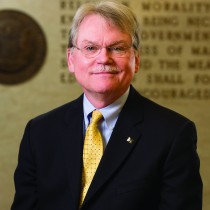Magazine

Writing the Handbook on Teaching with Archives
Each year, more than 1,000 undergraduate students come to the Bentley to engage with its archival collections. Some are here for “orientations” to the collections, some to be trained for longer-term research projects in their courses, and some will spend the year here doing research for an honors thesis.
It would be nice if there were a kind of “handbook” of best practices for faculty and archivists who wish to stimulate and encourage the interest of these students. But surprisingly such a thing does not exist.
So we at the Bentley have decided to write it ourselves.
In January, five archivists from the Library and eight members of the University’s tenure-track teaching faculty began meeting weekly in an attempt to perfect the way that University faculty use archival collections for teaching here and elsewhere.
That this seminar is happening at all is the result of an award to the Bentley of $760,000 from the Provost’s Third-Century Fund. Each year, a campus-wide panel of faculty members selects, after intense competition, the projects that it believes will make the greatest contribution to “engaged education” on the campus. We were proud and pleased to be selected for this award last May.
Engaged education today refers to activities outside the traditional classroom, which display and enhance the special characteristics of residential university education in the 21st century. The Bentley is a perfect example of this kind of engagement because its archival holdings make it a kind of laboratory for historical research across disciplines.
Everyone in the seminar this year is a veteran user of the Bentley archives in a variety of courses: how to write history, the history of wars in America, the architecture of Albert Kahn, Jewish students at the University of Michigan, African American history in Michigan, and the general history of the University itself. Our archivists come from University collections and reference.
We’re busy getting to know one another, learning about one another’s expertise and experience, sharing syllabi, assignments, and expectations. Already we know one important thing: Working together with a shared understanding of what we hope to accomplish by bringing the students to the archives will lead to a better outcome for them.
The seminar will run annually for up to five years. In addition, three of us have received a prestigious M-CUBED research grant that we will use to conduct research about whether the ideas we generate in the seminar actually work better in the classroom.
We will report on this important work from time to time.
